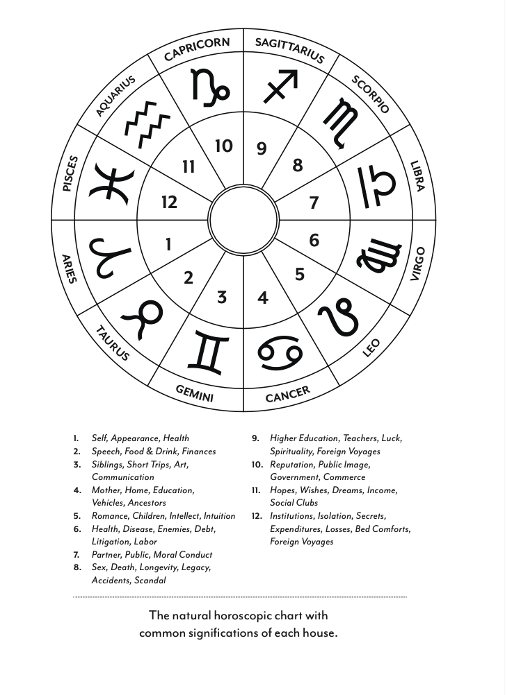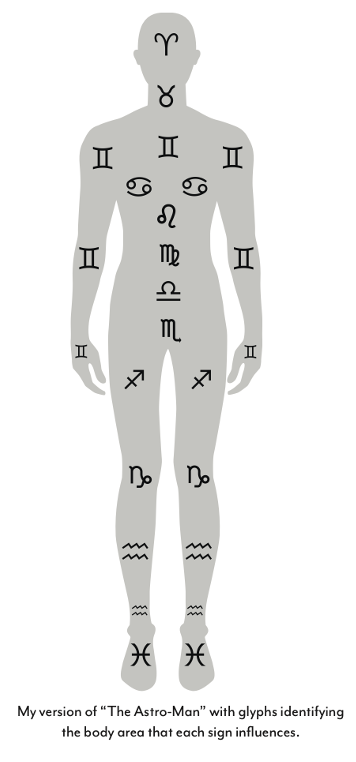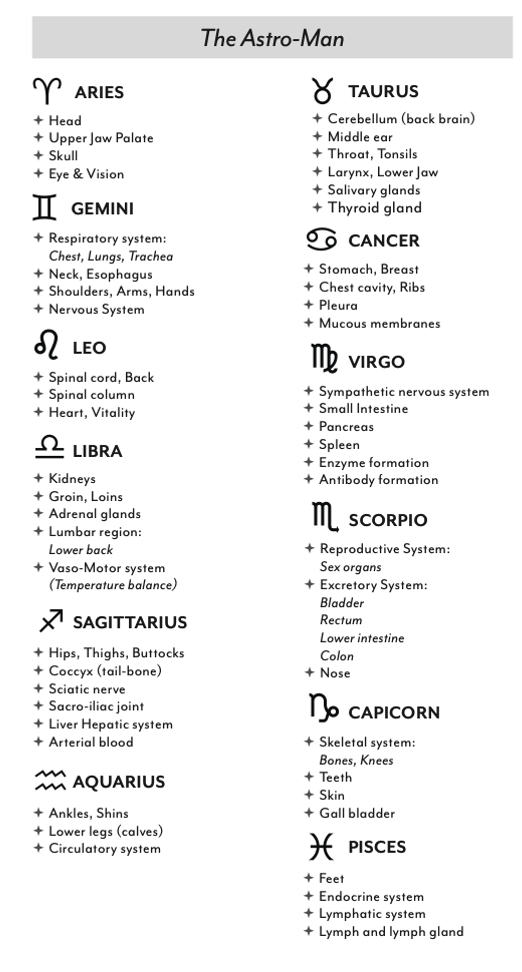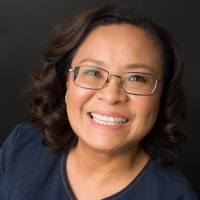Personality by Sign
“An individual’s personality is a reflection of the planet’s nature.” She gave an example of how Mercury, the planet of communication, would act in the different signs. “This is how a person born in thesign of Leo, the showman of the zodiac, would describe a car accident. If his Mercury was in the constellation of Taurus at the time of birth, this person would talk about the damage done to the car. If the planet was in Pisces, he would ask if anybody got hurt. Mercury in Virgo would want to know all the details of the event. With Mercury in the sign of Capricorn, the Leo person would be all business and ask whether the parties had insurance. With Mercury placed in the sign of Aquarius, representing the humanitarian, he would ask about the welfare of those involved. The Leo person with an Aries Mercury would impatiently describe the collision, while the Gemini Mercury would report it immediately.”
Medical Astrology by Alicia Blando, MD
Medical Astrology: Your Birthday Can Reveal Medical Conditions
How did astrology start?
Astrology is the study of planetary cycles. Medical astrology is an extension of the original subject. Early civilization recognized the recurring patterns that the objects made in the sky. The Sun rose every twenty-four hours, but each day brought about different experiences. Every year brought about four familiar seasons and each period varied in intensity and duration. Nature on earth and the patterns of the Sun, Moon and stars in the extended environment of the sky, were integrated into daily life. Farmers learned to utilize indicators, like weather, to determine when to plant and when to harvest crops. Before compasses, sailors relied on the positions of the spheres above the horizon to guide their vessels. Out of necessity, understanding the relationship of the objects in the sky with the environment on Earth helped early civilization survive.
In ancient times, priests were early astronomers responsible for picking auspicious times for celebration and rituals, such as sacrifice in the interest of their king and for the prosperity of their society. Except for the king, the priests weren’t concerned with how the common man was affected by objects in the sky. Prediction for individuals came later.

A Horoscope
Western astrology uses the horoscope which is a circular diagram divided into twelve pie-shaped sections assigned to each of the twelve zodiac signs and represents twelve domains of life. It represents a blueprint of a person’s life, a map of a person’s potential in areas such as the self, how we deal with family members, our finances, how we express ourselves, and even our predisposition for certain occupations and diseases. The planets (Mercury, Venus, Earth, Mars, Jupiter, Saturn, Uranus, Neptune, and Pluto)) and luminaries (Sun and Moon) are plotted on this diagram based on which constellation they are positioned at the date, time, and location of a person’s birth.
Many terms refer to the same concept: zodiacal chart, astrological chart, and horoscope. Constellation describes the pattern of stars in the sky, while sign is the term used when referring to a section (house) of the astrological chart (diagram) to which the constellation is assigned.
The Homunculus
The brain is an internal control of body functions: thoughts, memory and speech, arm and leg movements and the function of many organs within the body. To the right is a schematic of a cross-section of the brain showing which area directs which body function. .png)
Courtesy of Science History Images/Alamy Stock Photo
Medical Astrology
Medical astrology is a specialized field that can describe the tendencies for almost any physical ailment, whether musculoskeletal, gastrointestinal, neurological, or cardiac. Hippocrates, considered the father of medicine, was an astrologer. Hippocrates insisted his students study astrology, saying, “He who does not understand astrology is not a doctor but a fool.” (Hippocrates on the Importance of Astrology, Stephanie Gailing) He taught that the astrological signs, the luminaries and planets were associated with different parts of the body. Nature’s external influence on man was accepted and integrated into mainstream thinking.
 To the left is Astro-man, my diagram of how the external nature of the sky influences the body.
To the left is Astro-man, my diagram of how the external nature of the sky influences the body.

Interpretation
From the horoscope, interpretation of what the planets and the different combinations mean comes from the information passed down from the collective observations of ancient astrologers and the astrologer’s integration of the client’s circumstances. The astrological chart can be likened to a road map in time with the starting point being the date, time, and place of birth. As the planets revolve in their orbits, their position in the horoscope is recalculated and reflects how the person is changing and maturing in such areas as health relationships, work, and home life.” Interpretation is dependent on the skill of the map reader, the astrologer.
As a doctor, I study how a disease progresses and the possible ways it manifests. I can reasonably predict the path of a disease with or without medical intervention. I ask patients about their medical and social histories and habits, like food choices and exercise regimen. Their answers allow me to formulate opinions about the cause of their symptoms and their tendencies for health-related problems, like heart disease, diabetes, and even risk for cancer. This interaction focuses my physical examination and treatment plan. My prognosis for a patient’s health condition consists of possible outcomes within a range dictated by their history, lab data, and response to treatment. I do not know when organ damage will occur until the conditions become symptomatic, such as in a heart attack or stroke. I only treat the symptoms.
A skilled astrologer can study what the planets and what the different combinations mean and can describe which tendencies, including medical, physical, or emotional conditions, would likely manifest in a person’s life—and when.
To be a good practitioner in any field, one has to gain proficiency, learning the basic tenets and then being able to filter layers of information to focus on a reasonable conclusion; termed a diagnosis in medical language, and a prediction in astrological jargon. I chose to study astrology as the facts regarding the movement of the planets are hard to manipulate. I understood the theory, learned the mythology, and was willing to accept the rules to see if astrology worked. As I continued to study the correlation of planetary cycles with a person’s health, the prediction aspect appeared to be less and less like magic.
I have not practiced this knowledge on my patients as they expect western medicine. I will use myself as an example of how my horoscope reflects my medical conditions. I have a strong Mars placed in the eighth house (see first diagram above). Some significations of the eighth house are accidents and death. When I was around the age of three or four, playing in the kitchen, I got hold of a knife and deeply lacerated my left shin. At age five years, I sat in between two sections of a couch. Someone pulled the sections apart and I fell, landing on the back of my head. Both times I had to go to the emergency room. At eight years old, I was hit from behind by a car sustaining many injuries that kept me in the hospital for three months.
The shield and spear are the symbols of the god of war, Mars which is interpreted as surgical knives in the right context. I had six biopsies on my right lower jaw, initially, to rule out cancer. I have undergone surgery for a right femur fracture and several abdominal surgeries after my car accident, and another abdominal surgery in my forties due to endometriosis. I also underwent bilateral carpal tunnel releases and breast biopsy and lumpectomy for presumptive cancer. The strength of Mars in my chart describes my tendencies for accidents, surgical intervention, and at times, near-death injuries.
I don’t feel that medical astrology can explain how the human body functions absolutely, but I feel that it can be used as an inexpensive, adjunct method to help clarify tendencies in the twelve areas of life represented by the horoscope. All that is needed is the date, time, and location of birth.
The Future of Astrology
I discuss acupuncture as an analogy to what is a possible future for astrology in Western medicine. In the mid-1990s, acupuncture was coming into vogue and patients were paying out-of-pocket for consultation. As society learned more about acupuncture, it became accepted as an alternative form of treatment to help alleviate pain and treat various forms of physical, mental, and emotional conditions, contributing to the development of “integrative medicine.” (Integrative Medicine: Acupuncture by
Paul F Crawford 3rd 1, David A Moss 2, Matthew K Hawks 1, Matthew J Snyder). Acupuncture eventually became vetted by insurance companies and is offered as a benefit for many medical plans. Western medical practitioners are studying acupuncture to complement their healing practices.
I am encouraged that many people, not just patients, are looking into astrology to gain insight into the many aspects of their lives (Obsessed With Astrology? Here’s What Therapists Think About This Trend by Emily DiNuzzoEmily DiNuzzo), whether they study the subject or seek professional counsel. I have hopes that with research and development of protocols, medical astrology will also fall into the category of complementary medicine.
This topic is further discussed in Open for Interpretation: A Doctor’s Journey into Astrology will be available in June, 2023. Alicia Blando MD can be contacted at www.aliciablando.com.
Enlarged diagrams:

.png)


ASTROLOGY RESOURCES:
There are now many organizations that promote astrological education and research in person and online. I have to thank astrologer Rick Levine (www.stariq.com), who has shared many YouTube discussions on the theory, history, and practical uses of astrology with which I’ve resonated. Thanks to my many teachers, too numerous to name, including Indigenous healers Oscar MiroQuesada and Susan Griffin. I recommend the following astrological organizations and websites for further exploration: Association for Astrological Networking, American College of Vedic Astrology, www.astrologydc.com, www.appliedvedicastrology.com, www.billsinclair.com, www.komilla.com, www.dgoldsteinphd.com, International Society for Astrological Research (ISAR), www .jameskelleher.com, Arsha Jyotish (jyotish.com), The Astrology Podcast, Susan Miller’s Astrology Zone, National Council for Geocosmic Research, www.ronniedreyer.com, www.opaastrology.org, www.parasharaconference.com, www.MarcBoney.com,
www.AnneOrtelee.com, United Astrology Conference, www.vedicchart.com, www.vedictraditions.com, www.vedicsciences.com, and Kepler College based in Seattle, Washington.
There are many more teachers, institutions, and conferences that I have not yet experienced. EXPLORE!

